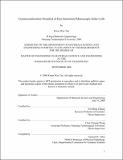Commercialization potential of dye-sensitized mesoscopic solar cells
Author(s)
Tan, Kwan Wee
DownloadFull printable version (2.968Mb)
Other Contributors
Massachusetts Institute of Technology. Dept. of Materials Science and Engineering.
Advisor
Yet-Ming Chiang and Chee Cheong Wong.
Terms of use
Metadata
Show full item recordAbstract
The price of oil has continued to rise, from a high of US$100 per barrel at the beginning 2008 to a new record of above US$140 in the recent weeks (of July). Coupled with increasing insidious greenhouse gas emissions, the need to harness abundant and renewable energy sources is never more urgent than now. The sun is the champion of all energy sources and photovoltaic cell production is currently the world's fastest growing energy market. Dye-sensitized solar cells (DSCs) are photoelectrochemical cells which mimic the natural photosynthesis process to generate solar electricity. Typically, a monolayer of dye sensitizer molecules is anchored onto a semiconductor mesoporous film such as TiO₂ to generate charges on exposure to illumination. The nanocrystalline particulate threedimensional network provides high surface area coverage for the photogeneration process and percolation of charges. In the thesis, we will review the current research efforts to optimize the DSC performance and develop probable applications to complement existing solid-state photovoltaic technologies. We believe the large and rapidly expanding solar market offers a prime commercial opportunity to deliver a DSC product for mass adoption by consumers. DSC is kept at a low production cost because it bypasses conventional vacuum-based semiconductor processing technologies, instead relying on solution and chemical processing routes. However, our cost modeling analysis show the TCO glass substrate and ruthenium dyes could constitute more than 90% of the overall materials cost. (cont.) Thus, we recommend new technological approaches must be taken to keep the substrate pricing low and continuously improve the energy conversion efficiencies to further lower the production cost.
Description
Thesis (M. Eng.)--Massachusetts Institute of Technology, Dept. of Materials Science and Engineering, 2008. This electronic version was submitted by the student author. The certified thesis is available in the Institute Archives and Special Collections. Cataloged from student submitted PDF version of thesis. Includes bibliographical references (p. 67-73).
Date issued
2008Department
Massachusetts Institute of Technology. Department of Materials Science and EngineeringPublisher
Massachusetts Institute of Technology
Keywords
Materials Science and Engineering.